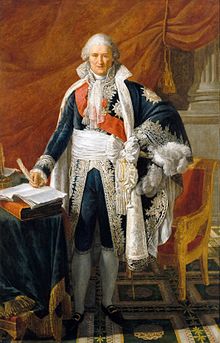Jean-Étienne-Marie Portalis

Jean-Étienne-Marie Portalis (born April 1, 1746 in Le Beausset , † August 25, 1807 in Paris ) was a French lawyer , legal philosopher and minister of education .
biography
Jean-Étienne-Marie Portalis came from an upper-class Provencal family. He appeared as a lawyer in Aix-en-Provence in 1765 and soon acquired a significant practice through his knowledge and eloquence. One of his first writings, which he published as a student, was a refutation of Rousseau's Émile , in which he described the dangers of disbelief. Through the writing Sur la distinction des deux puissances (1766), which was directed against the clergy, and the Consultation sur la validité des mariage des protestants en France (Paris 1770) he became known in wider circles. From 1778 he worked in the estate administration of his homeland.
When the French Revolution broke out , Portalis withdrew to the country because of the danger to his personal safety. He later went to Lyon and in 1793 to Paris, where he was arrested as a suspect and held until the fall of Robespierre (July 1794). After that, he was released again, worked as a lawyer in the capital and was elected to the council of the elderly by the Seine department in 1795 , of which he became president in 1796. With his speaking talent, he supported the moderate party and opposed the procedure of the board of directors . After the coup d'état of the 18th Fructidor V (September 4, 1797) he was sentenced to deportation to Guiana , but he escaped to Holstein to see Count Friedrich Karl von Reventlow .
Returned to France after the coup d'état of 18th Brumaire VIII (November 9th 1799), Portalis was appointed governor of the court of prizes by Napoleon Bonaparte . As a member of the Council of State, in which he received a seat and vote in September 1801, he was instrumental in drafting the Code civil , one of the most important civil codes in the history of the law of reason . After having worked for the organization of ecclesiastical affairs and the conclusion of the Concordat with the Pope, he was appointed Senator by Napoleon in 1803 and Minister of Education in July 1804. As such, he made the consolidation of the monarchical form of government very important. Napoleon, who had become emperor, rewarded him with the Grand Cross of the Legion of Honor . In the last years of his life, Portalis suffered from an eye disease that made him almost completely blind. He died on August 25, 1807 at the age of 61 and was buried in the Panthéon in Paris .
In addition to his interesting Discours, rapports et travaux inédits sur le Code civil (Paris 1844) and Discours, rapports et travaux sur le concordat de 1801 (Paris 1845), which were published by Frédéric Portalis after his death, Portalis left the work De l ' usage et de l'abus de l'esprit philosophique durant le dix-huitième siècle (2 vols., Paris 1820; 3rd ed. 1833).
literature
- Jean-Étienne-Marie Portalis . In: Meyers Konversations-Lexikon . 4th edition. Volume 13, Verlag des Bibliographisches Institut, Leipzig / Vienna 1885–1892, p. 241.
Web links
- Literature by and about Jean-Étienne-Marie Portalis in the catalog of the German National Library
- Biography (french)
- Short biography and list of works of the Académie française (French)
| personal data | |
|---|---|
| SURNAME | Portalis, Jean-Etienne-Marie |
| BRIEF DESCRIPTION | French lawyer, legal philosopher and minister of education |
| DATE OF BIRTH | April 1, 1746 |
| PLACE OF BIRTH | Le Beausset |
| DATE OF DEATH | August 25, 1807 |
| Place of death | Paris |